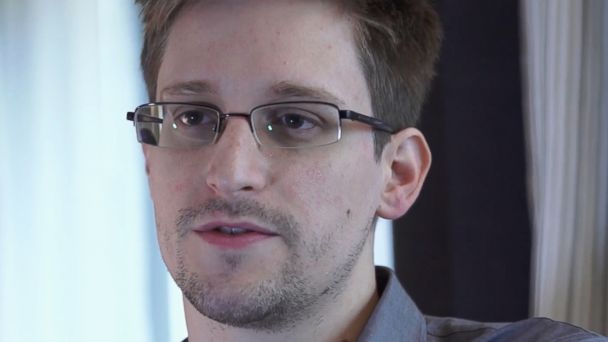Should President Obama Pardon Edward Snowden?

The Guardian/Glenn Greenwald and Laura Poitras/File/AP Photo
Edward Snowden might have woken up feeling vindicated after President Obama's review group issued its recommended reforms for the National Security Agency's surveillance programs this week.
Weaved throughout the working group's 46 recommendations shines one clear conclusion: The agency has gone too far.
Snowden's allies have long called him a patriot despite the insistence of the Obama administration that his actions, leaking potentially thousands of classified and sensitive documents to the media, constitute a felony.
But in the six months since those documents revealed the small portions of what has since come to light as a massive and potentially runaway surveillance regime, a federal court has concurred that the mass collection of phone records is unconstitutional. Obama's own review board found that in general, NSA's programs haven't been essential to preventing attacks, and members of Congress are increasingly calling for reform.
So should Edward Snowden get a second look from President Obama?
Asked at a press conference today, President Obama side-stepped the question.
"I think that, as important and as necessary as this debate has been, it is also important to keep in mind that this has done unnecessary damage to U.S. intelligence capabilities and U.S. diplomacy," Obama said. "But I will leave it up to the courts and the attorney general to weigh in publicly on the specifics of Mr. Snowden's case."
Snowden's leaks brought to light information about the scope of the NSA's activities that even the president and congressional leaders were left in the dark about.
"The big part of the story has been the disconnect between the oversight bodies in the executive and legislative branch and their understanding of these very complicated programs," said Michael Desch, a national security expert and University of Notre Dame professor of political science.
Snowden's allies say that alone is grounds for him to be thanked for his public service rather than charged with a crime.
"Now we know that even the president needs leaks from Edward Snowden to be fully informed about the dastardly acts of his own top spy agency," wrote Robert Scheer, a writer for The Nation. Obama "should welcome Snowden back to his country and give him the Medal of Freedom for his public service," he said.
If Obama pardoned Snowden it could be a sign of good faith to his progressive supporters who are growing more concerned about surveillance overreach. As a result some progressives and libertarian Republicans have formed an unlikely partnership to counter the NSA.
Nearly 150,000 people signed a White House petition in June calling for Obama to pardon Snowden. That petition has gone five months without a response.
At a meeting with tech executives at the White House this week, one reportedly asked Obama directly to issue a Snowden pardon.
And more and more congressional reactions to the NSA programs are turning sour.
"The message to the NSA is now coming from every branch of government and from every corner of our nation: You have gone too far," wrote Sen. Patrick Leahy, D-Vt., chairman of the Judiciary Committee, in response to the NSA review board's report on Wednesday. "The bulk collection of Americans' data by the U.S. government must end."
Sen. Rand Paul, R-Ky., who has from the beginning opposed NSA's surveillance programs, suggested on Thursday that Snowden's alleged crimes were small compared to the gravity of the NSA's constitutional problems. He called on the Director of National Intelligence James Clapper to resign.
"That Clapper is lying to Congress is probably more injurious to our intelligence capabilities than anything Snowden did," Paul told CNN's Wolf Blitzer. "Clapper has damaged the credibility of the entire intelligence apparatus, and I'm not sure what to believe anymore when they come to Congress."
Still, White House has repeatedly shot down suggestions that they might be lenient with Snowden.
And congressional Republicans who are hostile to libertarian and dovish elements within their own party would undoubtedly side with national security officials who still view Snowden as potentially guilty of treason.
If Obama's administration is at all lenient toward Snowden, it could come in the form of a quid pro quo.
"I would need assurances that the remainder of the data could be secured and my bar for those assurances would be very high, it would be more than just an assertion on his part," said Rick Leggett, the NSA official charged with assessing the damage caused by Snowden's leaks, in an interview with CBS.
That line of thinking is "not unanimous," he conceded.
And Obama today discounted the notion that Leggett's comments were a "trial balloon" to gauge the potential reaction to any leniency for Snowden. "There's a difference between Mr. Leggett saying something and the president of the United States saying something," he said.
There are several reasons why, even if he wanted to, pardoning Snowden could prove to be difficult.
Not only does the NSA not know exactly how much information Snowden has, but he very likely might not be in full control of it.
And NSA officials, including NSA Director Keith Alexander, have made it clear that Snowden's punishment could serve as an important deterrent against future leaks.
Pardoning Snowden is definitely within Obama's authority, Desch says, but it could come at significant cost.
"I think it would cause a political firestorm unless it were endorsed by the intelligence community and was part of an explicit agreement that Snowden would cooperate wholesomely with the damage assessment that is being conducted internally about the results of the leaks," Desch said.